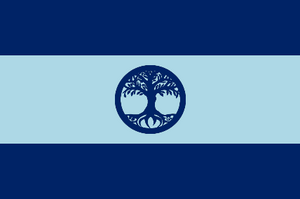President of Fratanica
| President of the Federal Republic of Fratanica | |
|---|---|
| Style | Mr. President (informal) His Excellency (formal) Commander-in-Chief (military) The Virtuous Gentleman, President Lukas Wolf |
| Status | Head of state Executive president |
| Abbreviation | POF |
| Member of | Office of the President Fratanican Armed Forces National Security Council |
| Residence | Presidential Palace, Viras, Fratanica |
| Term length | 4 years, 2 term limit |
| Constituting instrument | Constitution of Fratanica |
| Precursor | President of the Fratanican Republic |
| Formation | August 19, 1941 |
| First holder | Bernard Petit |
| Salary | $152,440 NSD |
| Website | https://president.gov.fr |
The president of Fratanica, officially the President of the Federal Republic of Fratanica, is the head of state of Fratanica and commander-in-chief of the Fratanican Armed Forces. The president is considered to be an executive president, holding power over both the armed forces and foreign affairs. The position was established on August 19th, 1941, just 2 days after the August 17th coup. The Fratanican presidency is considered the highest office of the land, holding great prestige as a position despite its limited governmental powers.
Under the Fratanican constitution, the President is the head of state of Fratanica. However, unlike other parliamentary republics, the President does have limited executive power and is not merely a figurehead. The Constitution delegates military and foreign affairs as responsibilities for the President, while economic and domestic policy is handled by the Prime Minister. The President was initially given one 6-year term with no chance at reelection, however, this was amended in 1968 to give a 4-year term with two term limit.
The current President is Lukas Wolf, who succeeded President Francisco Aguillon on September 18, 2020.
History
Power and responsibilities
The President has some powers attributed to his office, afforded to the officeholder by the Constitution of Fratanica. Their greatest power is to appoint the Prime Minister and nominate high-ranking civil officers.
The President is given the following powers:
- Appoints the Prime Minister
- Appoints ministers, and other high-ranking governmental officials with advice of the Prime Minister and consent of a majority of the National Assembly, including Supreme Court appointees
- Dissolve the National Assembly (lower house) after consulting the Prime Minister and the house's leadership, with a snap election being held under 30 days, but not the Federation Council
- Serves as the commander-in-chief of the Fratanican Armed Forces
- Dictates military and foreign policies
- Presides over and observes meetings of the Executive Council of Fratanica
- Call for a joint conference of the National Diet for the purpose of addressing both houses, can not propose legislation or participate in legislative debate
- Receives foreign ambassadors
- Can give pardons (but not amnesty), lessen criminal sentences
- Sign legislation into law
- Issue a one-time delaying veto of a law
- Can issue proclamatory decrees
- Direct the initiation of a national plebiscite, asking exploratory questions regarding policy and stances
Relationship between Prime Minister and President
The President appoints the Prime Minister, with consent of a parliamentary majority. This usually means that the President appoints a Prime Minister popular with the majority parties or party coalition. The President can ask for the Prime Minister's resignation, however, they may not dismiss the Prime Minister.
Constitutionally, the President is assigned the spheres of military and foreign policy, whereas the Prime Minister handles domestic and economic policy. However, if both the President and Prime Minister are from the same party, these lines become blurred. In this case, the President often becomes involved in all areas of policy de facto, and it is decided by the President the amount of autonomy the Prime Minister has.
If the Fratanican presidency and the National Assembly are occupied by two opposing party coalitions, the President may be forced to appoint an opposition Prime Minister to the position. This is known as a state of cohabitation. In these cases, the President's ability to influence policy or command the federal government declines greatly, due to political gridlock.
Succession and incapacity
Should the President be incapacitated, then the Speaker of the National Assembly would become the acting President until they are no longer incapacitated. If neither of them are available, then an interim president must be appointed within 7 days by a special parliamentary committee. In that allotted time, the Executive Council of Fratanica assumes the powers of the presidency.
The line of succession is not automatically ensured to anybody besides the Speaker, however, the precedent is that an experienced statesman from the former President's political party is appointed to the presidential position. The appointment is conducted by a special parliamentary committee made up of senior legislators, the committee's members being proportionally in line with the National Assembly itself.
Pay and official residences
The official salary of the President is around $152,440 NSD, or Ꞙ190,000. The salary is subject to income tax.
The official residence of the President of Fratanica is the Presidential Palace, located in the heart of the capital city, Viras.

